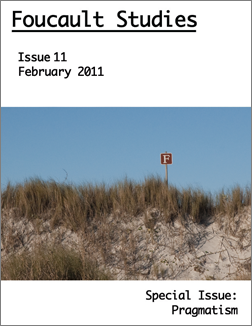Situation, Meaning, and Improvisation: An Aesthetics of Existence in Dewey and Foucault
DOI:
https://doi.org/10.22439/fs.v0i11.3203Abstract
This essay explores important intersections between the thought of John Dewey and Michel Foucault, with special attention to the distinction between emancipation versus “practices of freedom.” The complex relationship between these thinkers is, at once, complementary, divergent, and overlapping. The author however stresses the way in which both Dewey and Foucault portray situated subjects as improvisational actors implicated in unique situations, the meaning of which turns on the extemporaneous exertions of these implicated agents.Downloads
Published
2011-02-01
How to Cite
Colapietro, V. (2011). Situation, Meaning, and Improvisation: An Aesthetics of Existence in Dewey and Foucault. Foucault Studies, (11), 20–40. https://doi.org/10.22439/fs.v0i11.3203
Issue
Section
Special Issue on Foucault and Pragmatism
License
Authors retain copyright to their work, but assign the right of the first publication to Foucault Studies. The work is subject to a CC BY-NC-ND 4.0 license, but despite these restrictions, authors can take for granted that Foucault Studies will permit articles published in Foucault Studies to be translated or reprinted in another format such as a book providing a full reference is made to Foucault Studies as the original place of publication.



